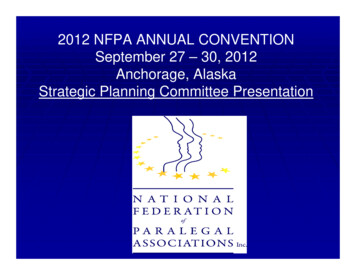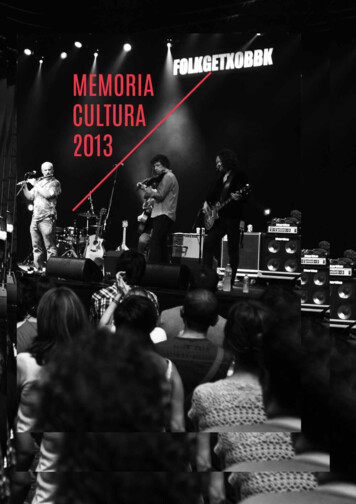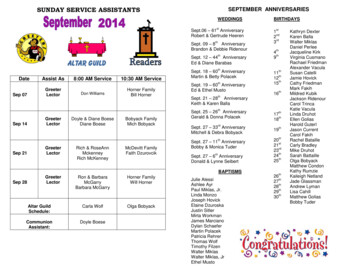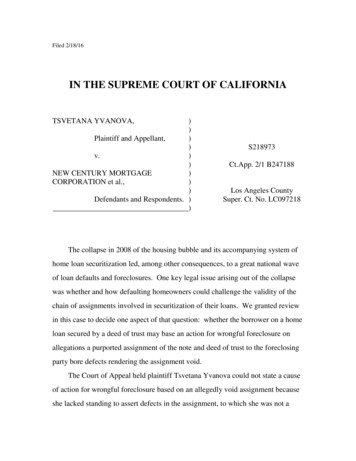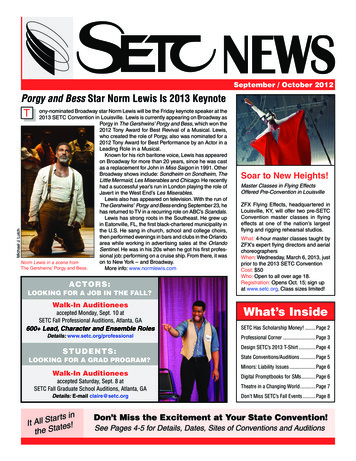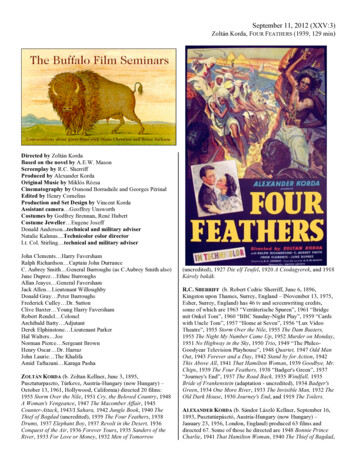
Transcription
September 11, 2012 (XXV:3)Zoltán Korda, FOUR FEATHERS (1939, 129 min)Directed by Zoltán KordaBased on the novel by A.E.W. MasonScreenplay by R.C. SherriffProduced by Alexander KordaOriginal Music by Miklós RózsaCinematography by Osmond Borradaile and Georges PérinalEdited by Henry CorneliusProduction and Set Design by Vincent KordaAssistant camera Geoffrey UnsworthCostumes by Godfrey Brennan, René HubertCostume Jeweller Eugene JoseffDonald Anderson.technical and military adviserNatalie Kalmus.Technicolor color directorLt. Col. Stirling technical and military adviserJohn Clements Harry FavershamRalph Richardson Captain John DurranceC. Aubrey Smith General Burroughs (as C.Aubrey Smith also)June Duprez Ethne BurroughsAllan Jeayes General FavershamJack Allen Lieutenant WilloughbyDonald Gray Peter BurroughsFrederick Culley Dr. SuttonClive Baxter Young Harry FavershamRobert Rendel ColonelArchibald Batty AdjutantDerek Elphinstone Lieutenant ParkerHal Walters JoeNorman Pierce Sergeant BrownHenry Oscar Dr. HarrazJohn Laurie The KhalifaAmid Taftazani Karaga PashaZOLTÁN KORDA (b. Zoltan Kellner, June 3, 1895,Pusztaturpaszto, Túrkeve, Austria-Hungary (now Hungary) –October 13, 1961, Hollywood, California) directed 20 films:1955 Storm Over the Nile, 1951 Cry, the Beloved Country, 1948A Woman's Vengeance, 1947 The Macomber Affair, 1945Counter-Attack, 1943/I Sahara, 1942 Jungle Book, 1940 TheThief of Bagdad (uncredited), 1939 The Four Feathers, 1938Drums, 1937 Elephant Boy, 1937 Revolt in the Desert, 1936Conquest of the Air, 1936 Forever Yours, 1935 Sanders of theRiver, 1933 For Love or Money, 1932 Men of Tomorrow(uncredited), 1927 Die elf Teufel, 1920 A Csodagyerek, and 1918Károly bakák.R.C. SHERRIFF (b. Robert Cedric Sherriff, June 6, 1896,Kingston upon Thames, Surrey, England – lNovember 13, 1975,Esher, Surrey, England) has 46 tv and screenwriting credits,some of which are 1963 “Verräterische Spuren”, 1961 “Bridgemit Onkel Tom”, 1960 “BBC Sunday-Night Play”, 1959 “Cardswith Uncle Tom”, 1957 “Home at Seven”, 1956 “Lux VideoTheatre”, 1955 Storm Over the Nile, 1955 The Dam Busters,1955 The Night My Number Came Up, 1952 Murder on Monday,1951 No Highway in the Sky, 1950 Trio, 1949 “The PhilcoGoodyear Television Playhouse”, 1948 Quartet, 1947 Odd ManOut, 1943 Forever and a Day, 1942 Stand by for Action, 1942This Above All, 1941 That Hamilton Woman, 1939 Goodbye, Mr.Chips, 1939 The Four Feathers, 1938 “Badger's Green”, 1937“Journey's End”, 1937 The Road Back, 1935 Windfall, 1935Bride of Frankenstein (adaptation - uncredited), 1934 Badger'sGreen, 1934 One More River, 1933 The Invisible Man, 1932 TheOld Dark House, 1930 Journey's End, and 1919 The Toilers.ALEXANDER KORDA (b. Sándor László Kellner, September 16,1893, Pusztatúrpásztó, Austria-Hungary (now Hungary) –January 23, 1956, London, England) produced 63 films anddirected 67. Some of those he directed are 1948 Bonnie PrinceCharlie, 1941 That Hamilton Woman, 1940 The Thief of Bagdad,
Korda—FOUR FEATHERS—21939 The Lion Has Wings, 1936 The Man Who Could WorkMiracles, 1936 Rembrandt, 1934 The Private Life of Don Juan,1934 The Rise of Catherine the Great, 1933 The Private Life ofHenry VIII, 1932 Reserved for Ladies, 1931 Rive gauche, 1930Princess and the Plumber, 1930 Women Everywhere, 1930 Liliesof the Field, 1929 Her Private Life, 1929 Love and the Devil,1928 Night Watch, 1927 The Private Life of Helen of Troy, 1927The Stolen Bride, 1926 Madame Doesn't Want Children, 1922Samson und Delila, 1920 The Prince and the Pauper, 1919 WhiteRose, 1917 St. Peter's Umbrella, 1916 Mesék az írógépröl, 1916Ciklámen, 1915 Lyon Lea, and 1914 Örház a Kárpátokban.MIKLÓS RÓZSA (April 18, 1907, Budapest, Austria-Hungary(now Hungary) – July 27, 1995, Los Angeles, California) wonthree best music Oscars: Spellbound (1945), A Double Life(1947) and Ben-Hur (1959). Some of his other 94 film musiccredits are 1982 Dead Men Don't Wear Plaid, 1981 Eye of theNeedle, 1979 Time After Time, 1979 Last Embrace, 1978Fedora, 1977 The Private Files of J. Edgar Hoover, 1977Providence, 1970 The Private Life of Sherlock Holmes, 1968 TheGreen Berets, 1963 The V.I.P.s,1962 Sodom and Gomorrah, 1961El Cid, 1961 King of Kings, 1959The World, the Flesh and the Devil,1958 A Time to Love and a Time toDie, 1957 The Seventh Sin, 1957Something of Value, 1956 Lust forLife, 1956 Bhowani Junction, 1954Green Fire, 1954 Valley of theKings, 1954 Men of the FightingLady, 1953 Knights of the RoundTable, 1953 Julius Caesar, 1953Young Bess, 1952 Ivanhoe, 1951Quo Vadis, 1950 The Miniver Story,1950 The Asphalt Jungle, 1949Adam's Rib, 1949 Madame Bovary, 1948 Command Decision,1948 The Naked City, 1947 Brute Force, 1947 The MacomberAffair, 1947 Song of Scheherazade, 1946 The Killers, 1946 TheStrange Love of Martha Ivers, 1945 The Lost Weekend, 1945Lady on a Train, 1945 The Man in Half Moon Street, 1944Double Indemnity, 1943 So Proudly We Hail!, 1943/I Sahara,1942 Jungle Book, 1941 That Hamilton Woman, 1940 The Thiefof Bagdad, 1939 The Four Feathers, 1938 The Divorce of LadyX, 1937 Murder on Diamond Row, 1937 Knight Without Armor,and 1937 Thunder in the City.OSMOND BORRADAILE (cinematographer) (b. Osmond HudsonBorradaile, July 17, 1898, Winnipeg, Manitoba, Canada – March23, 1999, Canada) has 27 cinematographer credits, most of themshorts. Some of the others are 1971 Travelin' Light, 1954 L'espritdu mal, 1952 Royal Journey, 1949 I Was a Male War Bride,1949 Saints and Sinners, 1948 Scott of the Antarctic, 1946 TheOverlanders, 1943 Action Stations, 1939 The Lion Has Wings,1939 The Four Feathers, 1938 Drums, 1937 Elephant Boy, 1935Sanders of the River, 1934 The Private Life of the Gannets, 1932Say It with Music.GEORGES PÉRINAL (cinematographer) (1897, Paris, France –April 23, 1965, London, England) has 71 cinematographercredits, among them 1960 Oscar Wilde, 1960 The Day TheyRobbed the Bank of England, 1960 Once More, with Feeling!,1958 tom thumb, 1958 Bonjour tristesse, 1957 A King in NewYork, 1957 Saint Joan, 1956 Loser Takes All, 1955 LadyChatterley's Lover, 1955 The Man Who Loved Redheads, 1951I'll Never Forget You, 1951 No Highway in the Sky, 1950Operation X, 1949 If This Be Sin, 1949 The Forbidden Street,1947 An Ideal Husband, 1947 A Man About the House, 1943 TheLife and Death of Colonel Blimp, 1941 Suicide Squadron, 1941Old Bill and Son, 1939 The Four Feathers, 1938 Prison WithoutBars, 1938 The Challenge, 1938 Drums, 1937 Murder onDiamond Row, 1937 Dark Journey, 1937 I, Claudius, 1936Rembrandt, 1936 Things to Come, 1935 Sanders of the River,1934 The Private Life of Don Juan, 1934 The Rise of Catherinethe Great, 1933 The Private Life of Henry VIII., 1932 Student'sHotel, 1932 The Chocolate Girl, 1932 The Blood of a Poet, 1931À Nous la Liberté, 1931 Le parfum de la dame en noir, 1931Jean de la Lune, 1931 Le Million, 1931 David Golder, 1930Under the Roofs of Paris, 1929 The New Gentlemen, 1928Misdeal, 1927 Six et demi onze, and 1926 La justicière.VINCENT KORDA (productiondesign) (b. Vincent Kellner, June 22,1897, Túrkeve, Hungary – January 4,1979, London, England) won a best artdirection Oscar for The Thief ofBagdad (1940). Some of his other 18films are 1964 The Yellow RollsRoyce, 1952 Breaking the SoundBarrier, 1952 Murder on Monday,1949 The Third Man, 1948 The FallenIdol, 1947 An Ideal Husband, 1939The Four Feathers, 1939 The Spy inBlack, 1939 Over the Moon, 1938Prison Without Bars, 1938 Drums,1937 Murder on Diamond Row, 1936The Man Who Could Work Miracles, 1936 Rembrandt, 1936Things to Come, 1935 The Ghost Goes West, 1933 The PrivateLife of Henry VIII, and 1932 Men of Tomorrow.JOHN CLEMENTS Harry Faversham (April 25, 1910, Hendon,London, England – April 6, 1988, Brighton, East Sussex,England) appeared in 28 tv and feature films, among them 1982Gandhi, 1982 “I Remember Nelson”, 1969 Oh! What a LovelyWar, 1963 The Mind Benders, 1963 “The Affair”, 1961 “ITVTelevision Playhouse”, 1961 “ITV Play of the Week”, 1958 TheSilent Enemy, 1953 “Henry V”, 1949 Call of the Blood, 1949Train of Events, 1944 They Came to a City, 1943 UndergroundGuerrillas, 1943 At Dawn We Die, 1941 Ships with Wings, 1941This England, 1940 Convoy, 1939 The Four Feathers, 1938 TheHidden Menace, 1938 Housemaster, 1938 South Riding, 1937Knight Without Armor, 1937 I, Claudius, 1936 Rembrandt, 1936Things to Come, 1936 Ticket of Leave, 1935 The Divine Spark,and 1935 Once in a New Moon.RALPH RICHARDSON Captain John Durrance (December 19,1902, Tivoli Road, Cheltenham, Gloucestershire, England –October 10, 1983, Marylebone, London, England) appeared in 82films, including 1984 Give My Regards to Broad Street, 1984Greystoke: The Legend of Tarzan, Lord of the Apes, 1983Invitation to the Wedding, 1982 “Witness for the Prosecution”,
Korda—FOUR FEATHERS—31981 Time Bandits, 1981 Dragonslayer, 1978 “No Man's Land”,1977 “The Man in the Iron Mask”, 1975 Rollerball, 1973“Frankenstein: The True Story”, 1973 O Lucky Man!, 1973/I ADoll's House, 1973 Lady Caroline Lamb, 1972 Alice'sAdventures in Wonderland, 1972 Tales from the Crypt, 1969“David Copperfield”, 1969 The Looking Glass War, 1969 MidasRun, 1969 Oh! What a Lovely War, 1967 Blandings Castle (6episodes), 1966 Khartoum, 1966 The Wrong Box, 1965 DoctorZhivago, 1965 Chimes at Midnight, 1963 “Hedda Gabler”, 1962Long Day's Journey Into Night, 1960 Exodus, 1959 Our Man inHavana, 1956 Smiley, 1955 Richard III, 1952 Murder onMonday, 1951 Outcast of the Islands, 1949 The Heiress, 1948The Fallen Idol, 1948 Anna Karenina, 1946 Secret Flight, 1943The Silver Fleet, 1942 The Avengers, 1939 The Lion Has Wings,1939 The Fugitive, 1939 The Four Feathers, 1939 Clouds OverEurope, 1938 The Citadel, 1938 The Divorce of Lady X, 1936The Man Who Could Work Miracles, 1936 Things to Come, 1935Alias Bulldog Drummond, 1934 The Return of BulldogDrummond, 1934 The King of Paris, 1933 Friday the Thirteenth,and 1933 The Ghoul.C. AUBREY SMITH General Burroughs (b. Charles AubreySmith, July 21, 1863 – London, England – December 20, 1948,Beverly Hills, Los Angeles, California) appeared in 111 films,some of which were 1949 Little Women, 1947 Unconquered,1946 Cluny Brown, 1945 And Then There Were None, 1944Secrets of Scotland Yard, 1944 The White Cliffs of Dover, 1944The Adventures of Mark Twain, 1943 Madame Curie, 1941 Dr.Jekyll and Mr. Hyde, 1941 Maisie Was a Lady, 1940 A Bill ofDivorcement, 1940 Waterloo Bridge, 1940 Rebecca, 1939Another Thin Man, 1939 Five Came Back, 1939 The FourFeathers, 1938 Kidnapped, 1937 Thoroughbreds Don't Cry,1937 The Prisoner of Zenda, 1937 Wee Willie Winkie, 1936Lloyd's of London, 1936 The Garden of Allah, 1936 Romeo andJuliet, 1936 Little Lord Fauntleroy, 1935 The Florentine Dagger,1935 The Gilded Lily, 1935 Clive of India, 1935 The Lives of aBengal Lancer, 1934 Cleopatra, 1934 Bulldog DrummondStrikes Back, 1934 One More River, 1934 The Scarlet Empress,1934 The House of Rothschild, 1933 Queen Christina, 1933Adorable, 1933 The Barbarian, 1933 Secrets, 1933 TheMonkey's Paw, 1932 Trouble in Paradise, 1932 Tarzan the ApeMan, 1931 The Phantom of Paris, 1931 Just a Gigolo, 1931Daybreak, 1931 Trader Horn, 1930 The Perfect Alibi, 1922Flames of Passion, 1920 Castles in Spain, 1920 The Face at theWindow, 1918 Red Pottage, 1915 John Glayde's Honor, and1915 The Builder of Bridges.JUNE DUPREZ Ethne Burroughs (May 14, 1918, Teddington,Middlesex, England – October 30, 1984, London, England)appeared in 19 films: 1961 One Plus One, 1951 “RobertMontgomery Presents”, 1947 Calcutta, 1946 That Brennan Girl,1945 And Then There Were None, 1945 The Brighton Strangler,1944 None But the Lonely Heart, 1943 Tiger Fangs, 1943 DonWinslow of the Coast Guard, 1943 Forever and a Day, 1942Little Tokyo, U.S.A., 1942 They Raid by Night, 1940 The Thief ofBagdad, 1940 The Crimson Circle, 1939 The Lion Has Wings,1939 The Four Feathers, 1939 The Spy in Black, 1936 TheCardinal, and 1936 The Amateur Gentleman.ALLAN JEAYES General Faversham (January 19, 1885 inLondon, England – September 20, 1963, London, England)appeared in 93 films and tv dramas, among them 1963 Reach forGlory, 1957 “Busman's Honeymoon”, 1950-1956 “BBC SundayNight Theatre”, 1956 “The Scarlet Pimpernel”, 1950 WaterfrontWomen, 1950 The Inheritance, 1948 Blanche Fury, 1945 Dead ofNight, 1943 At Dawn We Die, 1941 'Pimpernel' Smith, 1940 TheThief of Bagdad, 1940 The Flying Squad, 1940 Convoy, 1940Night Train to Munich, 1939 The Four Feathers, 1938 TheyDrive by Night, 1938 “Libel!”, 1938 13 Men and a Gun, 1938“Pride and Prejudice”, 1937 Murder on Diamond Row, 1937Return of the Scarlet Pimpernel, 1937 Knight Without Armor,1937 Elephant Boy, 1937 I, Claudius, 1936 Man of Affairs, 1936Rembrandt, 1936 Things to Come, 1935 Transatlantic Tunnel,1935 Sanders of the River, 1934 The Scarlet Pimpernel, 1934The Rise of Catherine the Great, 1933 Paris Plane, 1932 Womanin Bondage, 1931 The Ghost Train, 1929 The Hate Ship, 1925Bulldog Drummond's Third Round, 1922 The Hound of theBaskervilles, 1921 A Gentleman of France, and 1918 Nelson.CLIVE BAXTER Young Harry Faversham (1922, London,England – August 22, 1978) appeared in 24 films and tv dramas,among them 1962 “The Avengers”, 1962 “City Beneath theSea”, 1959 “Ask for King Billy”, 1959 “The Four Just Men”,1959 “The Invisible Man”, 1955 Navy Heroes, 1954 “RheingoldTheatre”, 1951 Bikini Baby, 1948 The Outsider, 1940 The StarsLook Down, 1939 The Four Feathers, 1938 “Badger's Green”,1938 “Ah, Wilderness!”, 1938 John Halifax, 1937 The Girl WasYoung, and 1937 School for Husbands.From World Film Directors, Volume I. Ed. John Wakeman.The H. W. Wilson Co. NY, 1987. Entry by Lenny Rubenstein.Zoltán Korda (Zoltán Kellner) ((May 3, 1895-October 13,1961), British director, editor, and scenarist, was born nearTúreve, Hungary, the second of three lavishly talented sons ofassimilated Jews, Henrik and Ernesztina (Weiss) Kellner. Hisfather was estate manager for the Salgo family in Puszta
Korda—FOUR FEATHERS—4Turpásztó, on the edge of the Hungarian plain. Like his elderbrother Sábdior [AlexanderKorda], Zoltán was enthralled as aboy by the writings of Jules Verne and other tales of adventure inexotic locales, a predilection reflected in all of his mostsuccessful films.Like his father, formerly a noncommissioned officer in theHussars, Zoltán Kellner had in his youth a fiery temper that oftengot him into fights. Sándor frequently had to intercede or join thefray, and the two brothers became very close. Their father’s earlydeath from a misdiagnosed case of appendicitis increased thefamily’s cohesion, especially when the widow and her three sonswere forced to move in with unsympathetic in-laws. Sándor soonmoved to Budapest, where he began to earn a little money as ajournalist and tutor while continuing his education. It was at thistime that he adopted the name Korda, originally using it as hisbyline.In 1908 the rest of the family joinedSándor in Budapest. Despite Zoltán’sdesire to become a writer, practicalconsiderations obliged him to enrollin a commercial high school. Upongraduation he worked as a clerk for acoal merchant until the summer of1914, when he was drafted into theAustro-Hungarian army.Commissioned as a lieutenant, hefought on the Galician front, wherehis lungs were seriously damaged ina gas attack. He never fullyrecovered, for the rest f his lifesuffering periodic bouts of disablingillness.Meanwhile, in 1912, Sándor Korda had entered the developingHungarian film industry, where he moved rapidly from successto success. By the time the war ended in 1918 he had built hisown film studio on the outskirts of Budapest and was establishedas Hungary’s top producer, as well as an important director andeditor of the country’s most influential film magazine. Zoltánjoined his brother’s Corvin studio in 1918, adopting the newfamily name of Korda. Beginning as an editor, he made his firstfilm, Karoly-Bakak, later the same year, codirecting withSándor’s partner Miklós Pásztory.Though not himself a communist, Sándor played an importantrole in the nationalization of the Hungarian film industry under acommunist government early in 1919. A few months later thecommunists were replaced by Horthy’s vengeful right-wingregime, and the “White Terror” followed—the murderouspersecution of communists, Jews, and liberal artists. Obviously aprime target, Sándor was arrested but gained his freedom thanksto the efforts and influence of his wife and of Zoltán, a woundedveteran and former officer.Like many other Hungarian filmmakers, Sándor went to Vienna,where he anglicized his first name to Alexander and joined theSascha film company. The rest of the family followed—Zoltán,the younger brother Vincent, then an art student, and theirmother. Zoltán became a cameraman and editor for Sascha, andprobably also edited Samson und Delila, a sub-Griffith epic madeby Alexander as an independent production. This was theKordas’ last film in Austria. They moved on again to Berlin,where Alexander launched a new production company and madehalf a dozen movies Zoltán worked once more as his editor andin 1927 directed his own first solo feature, Die Elf Teufel (TheEleven Devils).The same year Alexander Korda and his first wife Maria went toHollywood, where neither had much success and where theirmarriage ended. Alexander returned to Europe and made onenotable film in Paris, Marius (1931). The excellent sets were thework of Vincent Korda, who thus began his distinguished careeras an art director. In November 1931, Alexander went toEngland. Zoltán had belatedly followed Alexander toHollywood, where he worked as an editor and coscripted hisbrother’s movie Women Everywhere (1930). Again delayed by illhealth, he rejoined Alexander in 1933 in England.By this time Alexander had established yet another newproduction company, London Film Production, with Vincent incharge of the art department and Lajos Biro—another of“Korda’s Magyars”—heading thescript department. London Filmsbegan as a manufacturer of “quotaquickies”—low-budget programmersdesigned to meet the quota ofBritish-made films demanded by the1927 Cinematograph Act to combatHollywood’s domination of theBritish market. As Karol Kulik says,the results were often “an affront toboth British filmmakers and theBritish public, and gave British filmsa bad reputation.” On the other hand,these programmers did provideopportunities for young directors,writers, and performers to practice their crafts with a minimumof financial risk. In 1933 Zoltán Korda directed one such itemMen of Tomorrow, in collaboration with Leontine Sagan. Laterthe same year came his first British solo feature, a “quotaquickie” called Cash (For Love and Money in the United States).Alexander Korda was not content to churn out such modestentertainments. Still smarting at his failure in Hollywood, he wasdetermined to beat the dream factory at its own game. Before theend of 1933 he scored his first great success with The PrivateLife of Henry VIII. It was the first British film for many years tocapture and international market, and it established Korda as the“savior” of the British film industry (as he had been fifteen yearsearlier of the Hungarian industry). Another enormous success forLondon Films followed with The Scarlet Pimpernel (1934),directed like Henry VIII by Alexander himself.In 1935 Zoltán matched his brother’s triumphs with his secondfeature Sanders of the River (U.S., Bosambo). Based on EdgarWallace’s stories about a British district commissioner in darkestAfrica, the film was scripted by Lajos Biro and Jeffrey Dell andphotographed by Georges Périnal, Osmond Borrodaile, andLouis Page. Zoltán Korda and a crew of twelve spent fourmonths in West Africa filming the dances of half-a-dozendifferent tribes and recording their songs. Many of the songs areused in the film, either as they were recorded or—like the hit“Canoe Song”—in arrangements by the composer MischaSpoliansky and the picture’s musical director Muir Matheson.According to Zoltán Korda, the movie used 3,000 feet of filmshot on location. London’s publicity department reported that“the 20,000 African Negroes who take part in this picture
Korda—FOUR FEATHERS—5received most of their wages in the form of cartons of cigarettes.”Produced by Alexander Korda, this was the first film on whichall three Korda brothers worked together.Leslie Banks plays the wise administrator who maintains theking’s peace more by his moral strength than by force of arms.Paul Robeson was recruited to play the chieftain Bosambo, wholearns the truth of Sanders’ dictum “the job of a ruler is not to befeared, but to be loved.” However, as Raymond Durgnatremarked, the movie “wobbles deliciously” between this thesis“and a plot which proves the exact opposite. Indeed the nativeswith childlike wisdom, observe ‘We realize that we must live inpeace and love one another for if we do not O white master youwill punish us most cruelly.’”Sanders of the River was an international hit. KinematographWeekly called it “spectacular adventure drama, a fine tribute toBritish rule in Africa. Although spectacle predominates, it is notallowed to impose upon the author’s narrative skill, for the storycomes first all the time, and it carries with it an immense amountof general entertainment. The locale is new to screen drama andthe virgin territory has been explored with realshowmanship .The casting of Paul Robeson as Bosambo is aclever move. He not only acts well, but has a commanding screenpresence and a fine voicewhich is shrewdly utilized.”In fact, Robeson disowned thepicture for its condescendingracism, and in 1957, whenSanders was revived on Britishtelevision, it drew a protestfrom the NigerianCommissioner, who said it“brought Disgrace anddisrepute to Nigerians.” Therehave been suggestions that thefilm’s Anglophilia wasimposed by Alexander Korda,Zoltán being responsible for the more or less respectful (andoften valuable) ethnographic content of this and other Kordaepics of empire. On the other hand, in his accounts of thefilming, Zoltán reported almost reverently on the Britishadministrators he met in Africa, while describing tribal wayswith something closer to amiable contempt. In any case, DavidThomson, discussing Sanders in his Biographical Dictionary ofthe Cinema (1980), wrote that “in retrospect the imperialoffensiveness seems peripheral to an engaging taste foradventurous nonsense. It was the feeling for romance thatinspired the Korda empire.”Whether or not Zoltán and Alexander clashed over this aspect ofSanders of the River, there was certainly no shortage of fraternalconflict between them. Zoltán, who was inclined to feel that thepoor were morally superior to the rich, criticized his big brotherfor his legendary extravagance and called his lavish dinnerparties a “waste of bloody time.” Their disputes often spilledover onto the set, where they would quarrel violently, to thebewilderment of their British employees, in a mixture ofHungarian, German, and heavily accented English. In times oftrouble, however, the brothers’ loyalty to each other wasabsolute. Zoltán played an important role in foiling a bid bydisgruntled stockholders to wrest London Films fromAlexander’s control, and he cared for his brother devotedly whenhis health began to fail.In the mid-30s. Zoltán was one of several Korda directorsinvolved (uncredited) in the piecemeal creation of Conquest ofthe Air, a feature-length semi-documentary about the history ofaviation finally completed by Charles Frend in 1940. AfterForget Me Not (1936; U.S. Forever Yours), an inconsequentialromance, came Elephant Boy (1937). The film was originallyassigned to Robert Flaherty, who disappeared with his crew intothe Indian jungles and spent a year shooting fifty-five hours of“background.” Zoltán Korda was given the unenviable task ofadding studio material that would turn this mass of mostlydocumentary footage into an economically viable feature.Korda had a considerable asset in Sabu, a twelve-year-oldcharmer who had been working as a stable boy at the court of anIndian maharajah when Flaherty discovered him and cast him inthe film’s lead role. Based loosely on Kipling’s story of “Toomaiof the Elephants,” the film is about a boy with a hereditarygenius for handling elephants, his friendship with the great bullelephant Kala Nag and his involvement with Peterson (WalterHudd), a white hunter who uses Kala Nag and Toomai in anexpedition to capture wild elephants.Elephant Boy was attacked bothby lovers of Kipling andadmirers of Flaherty. GrahamGreene, for example,complained of “the bad cutting,the dreadful studio work, thepedestrian adaptation so unfairto Kipling’s story” andespecially its climax, the secretdance of the elephantswitnessed—alone amonghumans—by Toomai. Greenewrote that “to use the gatheringof the wild elephants at theirjungle dance-floor merely to resolve the problem of PetersenSahib who has got to trap a certain number of elephants forlabour if he is to retain his job—that is to throw away the wholepoetic value of the original.”Sabu starred again in Drum (1938; U.S, Drums), adapted byLajos Biro and others from the novel by A.E.W. Mason. Thistime he plays the young heir to a mountain kingdom on theNorthwest Frontier of India. He is threatened by the evilmachinations of his anti-imperialist uncle but ultimatelytriumphs, thanks to his own resourcefulness and the heroism ofthe British troops who befriend him. The film was much admiredfor its splendid location photography in Technicolor and forKorda’s characteristic use of authentic Indian music and dances.However, even in 1938 some critics resented its jingoism: OtisFerguson called it “a bang-up adventure job though particularlyanachronistic for this time and pregnant with Raymond Masseyand other bad jokes in black face.”Another A.E.W. Mason novel of imperialist adventure, The FourFeathers, had already been filmed two or three times beforeKorda made what is generally regarded as the definitive versionof the story, and his masterpiece. John Clements plays HarryFaversham, sensitive son of an army family who as a boy ladlistened terrified to the bloodthirsty dinner-table recollections ofhis father, the general (C. Aubrey Smith). Being a Faversham,
Korda—FOUR FEATHERS—6Harry takes a commission, but he loses his nerve and resignswhen his regiment sails for the Sudan to put down the Khalifa’suprising. He receives white feathers—the symbol of cowardice—from three of his brother officers an from his beloved Ethna(June Duprez).Ostracized by family, friends, and fiancée, Faversham goes aloneto Egypt, disguises himself as a mute tribesman, and joins theKhalifa’s army as a spy. After a desert engagement, he finds hisformer friend John Durrance alone and blinded by the sun.Without revealing his identity, he leads him back to the Britishlines. As he hands him over, he slips Durrance’s white featherinto his pocket and returns to the Khalifa’s camp. Here he joinshis other two friends in prison and, during the Battle ofOmdurman, frees them and helpswin victory for the British. Backin England, he is reinstated andmarries Ethna.“What is new is the drive—and inthe Sudanese sequences theconviction—of this newversion,”wrote Graham Greene.“Even the thickest of the ham—the old veterans discussing theCrimea in the Faversham home,among the portraits of militaryancestors—goes smoothly down,savoured with humour andsatire .So in The Four Feathersthe plot hardly matters: what isimportant is the colour, which isalmost invariably pleasant andsometimes gives a shock of pleasure .What is important isnocturnal London smoking up through Faversham’s greywindows; the close-up of mulberry bodies straining at the ropesalong the Nile; the cracked umber waste round the dried-upwells; the vultures dropping like weighted parachutes. It isimpossible to divide the credit between Mr. Zoltán Korda, thedirector, who has wiped out the disgrace of Sanders of the Riverand Mr R.C. Sheriff, author of the film play.”There was universal praise also for the scope and excitement ofthe battle scenes, some of which have been re-used in at leastfour other films, and for the quality of the acting. RalphRichardson, who played the blinded Durrance, growing frompanic to serene acceptance, created in about fifteen minutes ofscreen timea performance that, as C.A. Lejeune wrote, “isdeliberately scaled to heroic size. This is real acting in anindustry that barely knows the meaning of the word.”London Films’ The Thief of Bagdad (1940), like Conquest of theAir, was a much-delayed project in which number of Kordadirectors had a hand, Zoltán Korda among them. By the time itappeared, the Kordas were in Hollywood, where Zoltán directedthe last of his films with Alexander as his producer, Jungle Book(1942), a commercial if not a critical success. Sabu was cast asMowgli, the boy raised by wolves, and the scenarist LaurenceStallings tacked a plodding story about wicked treasure-huntersonto Kipling’s original fable. Dilys Powell wrote that the moviehad “a great deal of jungle and very little Book,” and BosleyCrowther found in it “a semblance of a super-Tarzan film inTechnicolor.”When Alexander Korda returned to Britain in 1943, Zoltánremained in Hollywood, where he next made Sahara (Columbia,1943). The picture was suggested by a notable Soviet film, TheThirteen, and scripted by Jon Howard Lawson and the director.Humphrey Bogart starred as Sergeant Joe Gunn, commanding anAmerican tank in the Libyan desert. He picks up an assortment ofstranded Allied soldiers after the fall of Tobruck, as well as arepentant Italian and an arrogant German pilot. In the end, thegoodies decide to make a stand at a desert waterhole against fivehundred thirsty German troops. Filmed with army cooperation inthe American southwest, the movie was praised for its originalityand realism and described by Alton Cook as “the most excitingmovie of desert warfare we have had from this war.”Counter-Attack (Columbia,1945) was also scripted by JohnHoward Lawson from a Sovietoriginal, in this case a stageplay that had alread
Long Day's Journey Into Night, 1960 Exodus, 1959 Our Man in Havana, 1956 Smiley, 1955 Richard III, 1952 Murder on Monday, 1951 Outcast of the Islands, 1949 The Heiress, 1948 The Fallen Idol, 1948 Anna Karenina, 1946 Secret Flight, 1943 The Silver Fleet, 1942 The Avengers, 1939 The Lion Has Wings,

